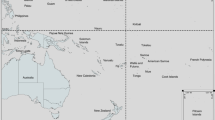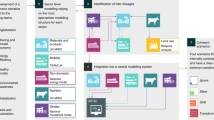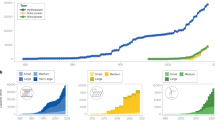Abstract
Aligning development and climate goals means Africa’s energy systems will be based on clean energy technologies in the long term, but pathways to get there are uncertain and variable across countries. Although current debates about natural gas and renewables in Africa are heated, they largely ignore the substantial context specificity of the starting points, development objectives and uncertainties of each African country’s energy system trajectory. Here we—an interdisciplinary and majority African group of authors—highlight that each country faces a distinct solution space and set of uncertainties for using renewables or fossil fuels to meet its development objectives. For example, Ethiopia is headed for an accelerated green-growth pathway, but Mozambique is at a crossroads of natural gas expansion with implicit large-scale technological, economic, financial and social risks and uncertainties. We provide geopolitical, policy, finance and research recommendations to create firm country-specific evidence to identify adequate energy system pathways for development and to enable their implementation.
This is a preview of subscription content, access via your institution
Access options
Access Nature and 54 other Nature Portfolio journals
Get Nature+, our best-value online-access subscription
$29.99 / 30 days
cancel any time
Subscribe to this journal
Receive 12 digital issues and online access to articles
$119.00 per year
only $9.92 per issue
Buy this article
- Purchase on Springer Link
- Instant access to full article PDF
Prices may be subject to local taxes which are calculated during checkout


Similar content being viewed by others
References
Africa Energy Outlook 2022 (IEA/OECD, 2022).
Towards a Prosperous and Sustainable Africa (IRENA, 2022).
Barasa, M., Bogdanov, D., Oyewo, A. S. & Breyer, C. A cost optimal resolution for sub-Saharan Africa powered by 100% renewables in 2030. Renew. Sustain. Energy Rev. 92, 440–457 (2018).
van der Zwaan, B., Kober, T., Dalla Longa, F., van der Laan, A. & Kramer, G. J. An integrated assessment of pathways for low-carbon development in Africa. Energy Policy 117, 387–395 (2018).
African Economic Outlook 2022 (ADB, 2022).
Mercure, J.-F. et al. Reframing incentives for climate policy action. Nat. Energy 6, 1133–1143.
Mulugetta, Y., Ben Hagan, E. & Kammen, D. Energy access for sustainable development. Environ. Res. Lett. 14, 020201 (2019).
Alova, G., Trotter, P. A. & Money, A. A machine-learning approach to predicting Africa’s electricity mix based on planned power plants and their chances of success. Nat. Energy 6, 158–166 (2021).
Winkler, H., Letete, T. & Marquard, A. Equitable access to sustainable development: operationalizing key criteria. Clim. Policy 13, 411–432 (2013).
Hafner, M. & Tagliapietra, S. The Geopolitics of the Global Energy Transition (Springer Nature, 2020).
Power, M. et al. The political economy of energy transitions in Mozambique and South Africa: the role of the rising powers. Energy Res. Soc. Sci. 17, 10–19 (2016).
Albert, O. The dominance of foreign capital and its impact on indigenous technology development in the production of liquefied natural gas in Nigeria. Rev. Afr. Polit. Econ. 45, 478–490 (2018).
Puig, D. et al. An action agenda for Africa’s electricity sector. Science 373, 616–619 (2021).
Kemfert, C., Präger, F., Braunger, I., Hoffart, F. M. & Brauers, H. The expansion of natural gas infrastructure puts energy transitions at risk. Nat. Energy 7, 582–587 (2022).
Hafner, M., Tagliapietra, S. & de Strasser, L. in Energy in Africa: Challenges and Opportunities (eds Hafner, M., Tagliapietra, S. & de Strasser, L.) 1–21 (Springer, 2018).
Trotter, P. A. Rural electrification, electrification inequality and democratic institutions in sub-Saharan Africa. Energy Sustain. Dev. 34, 111–129 (2016).
Bugaje, A.-A. B., Dioha, M. O., Abraham-Dukuma, M. C. & Wakil, M. Rethinking the position of natural gas in a low-carbon energy transition. Energy Res. Soc. Sci. 90, 102604 (2022).
Mutezo, G. & Mulopo, J. A review of Africa’s transition from fossil fuels to renewable energy using circular economy principles. Renew. Sustain. Energy Rev. 137, 110609 (2021).
Kigali Communique. Ensuring a Just and Equitable Energy Transition in Africa: Seven Transformative Actions for SDG7 (SEforALL, 2022); https://www.mininfra.gov.rw/index.php?eID=dumpFile&t=f&f=44024&token=c9d8a3e4e9ad4d22aa3c3b883055c9426760c584
Agutu, C., Egli, F., Williams, N. J., Schmidt, T. S. & Steffen, B. Accounting for finance in electrification models for sub-Saharan Africa. Nat. Energy 7, 631–641 (2022).
RISE 2020: Regulatory Indicators for Sustainable Energy—Sustaining the Momentum (The World Bank Group, 2020).
Trotter, P. A. et al. How climate policies can translate to tangible change: evidence from eleven low- and lower-middle income countries. J. Clean. Prod. 346, 131014 (2022).
Trotter, P. A., McManus, M. C. & Maconachie, R. Electricity planning and implementation in sub-Saharan Africa: a systematic review. Renew. Sustain. Energy Rev. 74, 1189–1209 (2017).
Musonye, X. S., Davíðsdóttir, B., Kristjánsson, R., Ásgeirsson, E. I. & Stefánsson, H. Integrated energy systems’ modeling studies for sub-Saharan Africa: a scoping review. Renew. Sustain. Energy Rev. 128, 109915 (2020).
Kirshner, J. D., Cotton, M. D. & Salite, D. L. J. Mozambique’s fossil fuel drive is entrenching poverty and conflict. The Conversation (15 July 2021); https://theconversation.com/mozambiques-fossil-fuel-drive-is-entrenching-poverty-and-conflict-163597
Ramachandran, V. Blanket bans on fossil-fuel funds will entrench poverty. Nature 592, 489 (2021).
Agenda 2063—The Africa We Want. (Africa Union Commission, 2015).
Global Solar Atlas (The World Bank Group, 2017).
Sterl, S., Fadly, D., Liersch, S., Koch, H. & Thiery, W. Linking solar and wind power in eastern Africa with operation of the Grand Ethiopian Renaissance Dam. Nat. Energy 6, 407–418 (2021).
Altieri, K. E. et al. Achieving development and mitigation objectives through a decarbonization development pathway in South Africa. Clim. Policy 16, S78–S91 (2016).
Sahlberg, A., Khavari, B., Korkovelos, A., Nerini, F. F. & Howells, M. A scenario discovery approach to least-cost electrification modelling in Burkina Faso. Energy Strateg. Rev. 38, 100714 (2021).
Alao, O. & Kruger, W. Review of Private Power Investments in sub-Saharan Africa. Power Futures Lab Working Paper (African Power Platform, 2021).
Gebreslassie, M. G. et al. Delivering an off-grid transition to sustainable energy in Ethiopia and Mozambique. Energy Sustain. Soc. 12, 23 (2022).
Eberhard, A. & Naude, R. The South African renewable energy independent power producer procurement programme: a review and lessons learned. J. Energy South. Afr. 27, 1–14 (2016).
Halsey, R., Bridle, R. & Geddes, A. Gas Pressure: Exploring the Case for Gas-Fired Power in South Africa (International Institute for Sustainable Development, 2022).
Dewa, M. T., Van Der Merwe, A. F. & Matope, S. Production scheduling heuristics for frequent load-shedding scenarios: a knowledge engineering approach. South Afr. J. Ind. Eng. 31, 110–121 (2020).
Pleeck, S., Denton, F. & Mitchell, I. An EU tax on African carbon—assessing the impact and ways forward Center for Global Development Blog Series https://cgdev.org/blog/eu-tax-african-carbon-assessing-impact-and-ways-forward (2022).
Montrone, L., Steckel, J. C. & Kalkuhl, M. The type of power capacity matters for economic development—evidence from a global panel. Resour. Energy Econ. 69, 101313 (2022).
Winkler, H., Tyler, E., Keen, S. & Marquard, A. Just transition transaction in South Africa: an innovative way to finance accelerated phase out of coal and fund social justice. J. Sustain. Financ. Invest. https://doi.org/10.1080/20430795.2021.1972678 (2022).
Burkina Faso Power Africa Fact Sheet (USAID, 2021).
Ouedraogo, B. I., Kouame, S., Azoumah, Y. & Yamegueu, D. Incentives for rural off grid electrification in Burkina Faso using LCOE. Renew. Energy 78, 573–582 (2015).
Dwumfour, R. A. & Ntow-Gyamfi, M. Natural resources, financial development and institutional quality in Africa: is there a resource curse? Resour. Policy 59, 411–426 (2018).
Semieniuk, G. et al. Stranded fossil-fuel assets translate to major losses for investors in advanced economies. Nat. Clim. Change 12, 532–538 (2022).
Waissbein, O., Glemarec, Y., Bayraktar, H. & Schmidt, T. S. Derisking Renewable Energy Investment. A Framework to Support Policymakers in Selecting Public Instruments to Promote Renewable Energy Investment in Developing Countries (United Nations Development Programme, 2013).
Schmidt, T. S. & Huenteler, J. Anticipating industry localization effects of clean technology deployment policies in developing countries. Glob. Environ. Chang. 38, 8–20 (2016).
Granoff, I., Hogarth, J. R. & Miller, A. Nested barriers to low-carbon infrastructure investment. Nat. Clim. Change 6, 1065–1071 (2016).
Falchetta, G., Dagnachew, A. G., Hof, A. F. & Milne, D. J. The role of regulatory, market and governance risk for electricity access investment in sub-Saharan Africa. Energy Sustain. Dev. 62, 136–150 (2021).
Egli, F., Steffen, B. & Schmidt, T. S. A dynamic analysis of financing conditions for renewable energy technologies. Nat. Energy 3, 1084–1092 (2018).
Sokona, Y. Building capacity for ‘energy for development’ in Africa: four decades and counting. Clim. Policy 22, 671–679 (2022).
World Development Indicators (The World Bank Group, accessed 25 May 2022); https://datatopics.worldbank.org/world-development-indicators/
Acknowledgements
This work was partially funded by the Climate Compatible Growth programme of the UK government. The views expressed here do not necessarily reflect the UK government’s official policies.
Author information
Authors and Affiliations
Corresponding authors
Ethics declarations
Competing interests
The authors declare no competing interests.
Peer review
Peer review information
Nature Energy thanks Boaventura Cuamba, Haileselassie Medhin and Mark Radka for their contribution to the peer review of this work.
Additional information
Publisher’s note Springer Nature remains neutral with regard to jurisdictional claims in published maps and institutional affiliations.
Rights and permissions
Springer Nature or its licensor (e.g. a society or other partner) holds exclusive rights to this article under a publishing agreement with the author(s) or other rightsholder(s); author self-archiving of the accepted manuscript version of this article is solely governed by the terms of such publishing agreement and applicable law.
About this article
Cite this article
Mulugetta, Y., Sokona, Y., Trotter, P.A. et al. Africa needs context-relevant evidence to shape its clean energy future. Nat Energy 7, 1015–1022 (2022). https://doi.org/10.1038/s41560-022-01152-0
Received:
Accepted:
Published:
Issue Date:
DOI: https://doi.org/10.1038/s41560-022-01152-0
This article is cited by
-
Sustainable pathways towards universal renewable electricity access in Africa
Nature Reviews Earth & Environment (2024)
-
Development transitions for fossil fuel-producing low and lower–middle income countries in a carbon-constrained world
Nature Energy (2024)
-
Change in cooling degree days with global mean temperature rise increasing from 1.5 °C to 2.0 °C
Nature Sustainability (2023)
-
Mission Energy Access for a just and sustainable future for all
Nature Energy (2023)
-
The cost of electrifying all households in 40 Sub-Saharan African countries by 2030
Nature Communications (2023)



